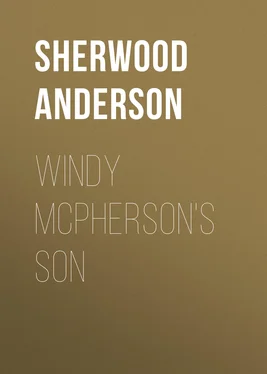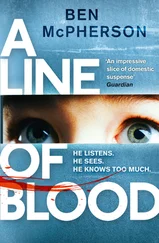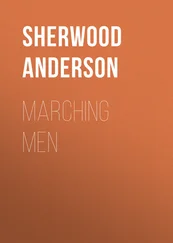Sherwood Anderson - Windy McPherson's Son
Здесь есть возможность читать онлайн «Sherwood Anderson - Windy McPherson's Son» — ознакомительный отрывок электронной книги совершенно бесплатно, а после прочтения отрывка купить полную версию. В некоторых случаях можно слушать аудио, скачать через торрент в формате fb2 и присутствует краткое содержание. Издательство: Иностранный паблик, Жанр: foreign_prose, literature_20, foreign_antique, на английском языке. Описание произведения, (предисловие) а так же отзывы посетителей доступны на портале библиотеки ЛибКат.
- Название:Windy McPherson's Son
- Автор:
- Издательство:Иностранный паблик
- Жанр:
- Год:неизвестен
- ISBN:нет данных
- Рейтинг книги:5 / 5. Голосов: 1
-
Избранное:Добавить в избранное
- Отзывы:
-
Ваша оценка:
- 100
- 1
- 2
- 3
- 4
- 5
Windy McPherson's Son: краткое содержание, описание и аннотация
Предлагаем к чтению аннотацию, описание, краткое содержание или предисловие (зависит от того, что написал сам автор книги «Windy McPherson's Son»). Если вы не нашли необходимую информацию о книге — напишите в комментариях, мы постараемся отыскать её.
Windy McPherson's Son — читать онлайн ознакомительный отрывок
Ниже представлен текст книги, разбитый по страницам. Система сохранения места последней прочитанной страницы, позволяет с удобством читать онлайн бесплатно книгу «Windy McPherson's Son», без необходимости каждый раз заново искать на чём Вы остановились. Поставьте закладку, и сможете в любой момент перейти на страницу, на которой закончили чтение.
Интервал:
Закладка:
Sam had been at Joe Wildman’s house; he knew the air of plenty and of comfort that hung over it; the table piled high with meat and potatoes; the group of children laughing and eating to the edge of gluttony; the quiet, gentle father who amid the clamour and the noise did not raise his voice, and the well-dressed, bustling, rosy-cheeked mother. As a contrast to this scene he began to call up in his mind a picture of life in his own home, getting a kind of perverted pleasure out of his dissatisfaction with it. He saw the boasting, incompetent father telling his endless tales of the Civil War and complaining of his wounds; the tall, stoop-shouldered, silent mother with the deep lines in her long face, everlastingly at work over her washtub among the soiled clothes; the silent, hurriedly-eaten meals snatched from the kitchen table; and the long winter days when ice formed upon his mother’s skirts and Windy idled about town while the little family subsisted upon bowls of cornmeal mush everlastingly repeated.
Now, even from where he sat, he could see that his father was half gone in drink, and knew that he was boasting of his part in the Civil War. “He is either doing that or telling of his aristocratic family or lying about his birthplace,” he thought resentfully, and unable any longer to endure the sight of what seemed to him his own degradation, he got up and went into the grocery where a group of Caxton citizens stood talking to Wildman of a meeting to be held that morning at the town hall.
Caxton was to have a Fourth of July celebration. The idea, born in the heads of the few, had been taken up by the many. Rumours of it had run through the streets late in May. It had been talked of in Geiger’s drug store, at the back of Wildman’s grocery, and in the street before the New Leland House. John Telfer, the town’s one man of leisure, had for weeks been going from place to place discussing the details with prominent men. Now a mass meeting was to be held in the hall over Geiger’s drug store and to a man the citizens of Caxton had turned out for the meeting. The housepainter had come down off his ladder, the clerks were locking the doors of the stores, men went along the streets in groups bound for the hall. As they went they shouted to each other. “The old town has woke up,” they called.
On a corner by Hunter’s jewelry store Windy McPherson leaned against a building and harangued the passing crowd.
“Let the old flag wave,” he shouted excitedly, “let the men of Caxton show the true blue and rally to the old standards.”
“That’s right, Windy, expostulate with them,” shouted a wit, and a roar of laughter drowned Windy’s reply.
Sam McPherson also went to the meeting in the hall. He came out of the grocery store with Wildman and went along the street looking at the sidewalk and trying not to see the drunken man talking in front of the jewelry store. At the hall other boys stood in the stairway or ran up and down the sidewalk talking excitedly, but Sam was a figure in the town’s life and his right to push in among the men was not questioned. He squirmed through the mass of legs and secured a seat in a window ledge where he could watch the men come in and find seats.
As Caxton’s one newsboy Sam had got from his newspaper selling both a living and a kind of standing in the town’s life. To be a newsboy or a bootblack in a small novel-reading American town is to make a figure in the world. Do not all of the poor newsboys in the books become great men and is not this boy who goes among us so industriously day after day likely to become such a figure? Is it not a duty we of the town owe to future greatness that we push him forward? So reasoned the men of Caxton and paid a kind of court to the boy who sat on the window ledge of the hall while the other boys of the town waited on the sidewalk below.
John Telfer was chairman of the mass meeting. He was always chairman of public meetings in Caxton. The industrious silent men of position in the town envied his easy, bantering style of public address, while pretending to treat it with scorn. “He talks too much,” they said, making a virtue of their own inability with apt and clever words.
Telfer did not wait to be appointed chairman of the meeting, but went forward, climbed the little raised platform at the end of the hall, and usurped the chairmanship. He walked up and down on the platform bantering with the crowd, answering gibes, calling to well-known men, getting and giving keen satisfaction with his talent. When the hall was filled with men he called the meeting to order, appointed committees and launched into a harangue. He told of plans made to advertise the big day in other towns and to get low railroad rates arranged for excursion parties. The programme, he said, included a musical carnival with brass bands from other towns, a sham battle by the military company at the fairgrounds, horse races, speeches from the steps of the town hall, and fireworks in the evening. “We’ll show them a live town here,” he declared, walking up and down the platform and swinging his cane, while the crowd applauded and shouted its approval.
When a call came for voluntary subscriptions to pay for the fun, the audience quieted down. One or two men got up and started to go out, grumbling that it was a waste of money. The fate of the celebration was on the knees of the gods.
Telfer arose to the occasion. He called out the names of the departing, and made jests at their expense so that they dropped back into their chairs unable to face the roaring laughter of the crowd, and shouted to a man at the back of the hall to close and bolt the door. Men began getting up in various parts of the hall and calling out sums, Telfer repeating the name and the amount in a loud voice to young Tom Jedrow, clerk in the bank, who wrote them down in a book. When the amount subscribed did not meet with his approval, he protested and the crowd backing him up forced the increase he demanded. When a man did not rise, he shouted at him and the man answered back an amount.
Suddenly in the hall a diversion arose. Windy McPherson emerged from the crowd at the back of the hall and walked down the centre aisle to the platform. He walked unsteadily straightening his shoulders and thrusting out his chin. When he got to the front of the hall he took a roll of bills from his pocket and threw it on the platform at the chairman’s feet. “From one of the boys of ‘61,” he announced in a loud voice.
The crowd shouted and clapped its hands with delight as Telfer picked up the bills and ran his finger over them. “Seventeen dollars from our hero, the mighty McPherson,” he shouted while the bank clerk wrote the name and the amount in the book and the crowd continued to make merry over the title given the drunken soldier by the chairman.
The boy on the window ledge slipped to the floor and stood with burning cheeks behind the mass of men. He knew that at home his mother was doing a family washing for Lesley, the shoe merchant, who had given five dollars to the Fourth-of-July fund, and the resentment he had felt on seeing his father talking to the crowd before the jewelry store blazed up anew.
After the taking of subscriptions, men in various parts of the hall began making suggestions for added features for the great day. To some of the speakers the crowd listened respectfully, at others they hooted. An old man with a grey beard told a long rambling story of a Fourth-of-July celebration of his boyhood. When voices interrupted he protested and shook his fist in the air, pale with indignation.
“Oh, sit down, old daddy,” shouted Freedom Smith and a murmur of applause greeted this sensible suggestion.
Another man got up and began to talk. He had an idea. “We will have,” he said, “a bugler mounted on a white horse who will ride through the town at dawn blowing the reveille. At midnight he will stand on the steps of the town hall and blow taps to end the day.”
Читать дальшеИнтервал:
Закладка:
Похожие книги на «Windy McPherson's Son»
Представляем Вашему вниманию похожие книги на «Windy McPherson's Son» списком для выбора. Мы отобрали схожую по названию и смыслу литературу в надежде предоставить читателям больше вариантов отыскать новые, интересные, ещё непрочитанные произведения.
Обсуждение, отзывы о книге «Windy McPherson's Son» и просто собственные мнения читателей. Оставьте ваши комментарии, напишите, что Вы думаете о произведении, его смысле или главных героях. Укажите что конкретно понравилось, а что нет, и почему Вы так считаете.












